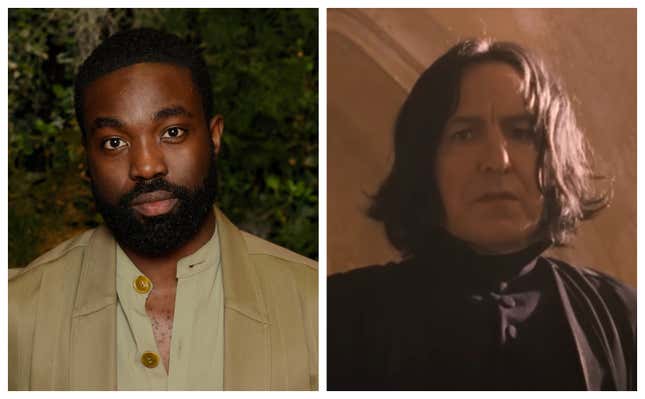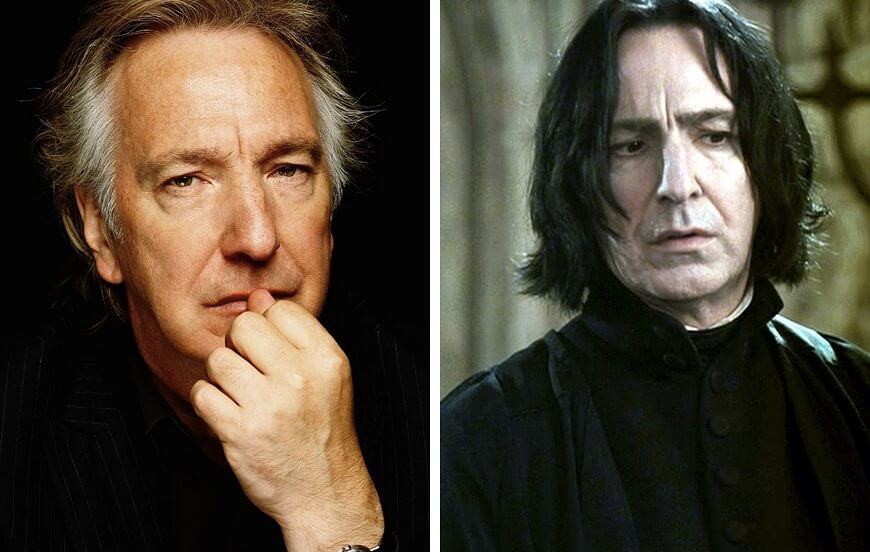The announcement that Paapa Essiedu, a talented Black actor, has been cast as Severus Snape in HBO’s upcoming Harry Potter television series has ignited a firestorm of debate among fans and critics alike. While discussions about race-swapping in adaptations are not new, the decision to cast a Black actor as Snape—a character explicitly described in J.K. Rowling’s books as pale, sallow, and quintessentially Caucasian—has raised complex questions about storytelling, fidelity to source material, and the unintended consequences of such choices. A recent video by Harry Potter Theory, titled “The BIGGEST Problem with a Black Snape (That Nobody Is Talking About),” has brought a critical yet overlooked issue to the forefront: how this casting decision risks altering the narrative’s thematic depth and introducing problematic racial implications that clash with the story’s original intent.
This article explores the multifaceted concerns surrounding Essiedu’s casting, drawing on fan reactions, literary analysis, and cultural commentary. While the decision reflects a broader push for diversity in media, it also underscores the delicate balance between inclusive representation and preserving the narrative integrity of a beloved franchise.
Snape’s Character: A Study in Nuance
Severus Snape is one of the most complex characters in modern literature. Introduced in Harry Potter and the Philosopher’s Stone as a menacing Potions master with a penchant for sneering, Snape evolves into a tragic antihero whose motivations—rooted in unrequited love, guilt, and redemption—unfold across seven books. His physical description is integral to his characterization: “sallow skin,” “greasy black hair,” and a “pallid, stringy” appearance as a teenager underscore his outsider status at Hogwarts. These traits, combined with his working-class background and half-blood heritage, paint a picture of a man marginalized not for his race but for his socioeconomic status and awkward demeanor.
Snape’s backstory, particularly his school years, is pivotal to understanding his resentment toward Harry Potter. Bullied relentlessly by James Potter and his friends, Snape’s humiliation—most notably in the infamous “Snape’s Worst Memory” scene, where James dangles him upside down before a crowd—fuels his lifelong bitterness. This dynamic is central to the story’s exploration of cycles of trauma, as Snape projects his hatred of James onto Harry, who inherits his father’s looks.
The Casting Controversy: Aesthetic vs. Thematic Concerns

The decision to cast Essiedu, a Black actor, as Snape has sparked varied reactions. Some fans celebrate the move as a step toward inclusivity, arguing that talent should trump physical fidelity to the books. Others, however, contend that Snape’s appearance is not merely cosmetic but a narrative device that reinforces his isolation. Posts on X reflect this divide, with users like @HogLegNews acknowledging Essiedu’s skill but questioning the fit: “Paapa seems to be a brilliant actor but having an attractive black man play Snape doesn’t make sense. Snape’s pallid/sallow sickly skin is an iconic image.”
The Harry Potter Theory video argues that the issue extends beyond aesthetics. It posits that casting a Black Snape risks transforming the story’s themes in ways that could misalign with Rowling’s vision. Specifically, it highlights the potential for Snape’s bullying to take on racial undertones, an interpretation absent from the original text. When James Potter, a white character, humiliates a Black Snape in front of peers, the scene could evoke imagery reminiscent of historical racial violence, such as lynchings—a comparison raised by The Express Tribune. This shift could frame James as not just a schoolyard bully but a figure perpetuating racial harm, altering his redemption arc and Harry’s legacy as his son.
Racial Implications and Narrative Distortion
The Harry Potter series is not devoid of racial commentary. Rowling uses blood purity as a metaphor for prejudice, with characters like Voldemort and the Malfoys espousing pure-blood supremacy akin to real-world racism. Snape, as a half-blood, navigates this hierarchy, his allegiance to the Death Eaters reflecting a desire for acceptance rather than racial ideology. Casting him as a Black character, however, risks conflating his marginalization with racial discrimination, which the books do not explicitly address.
Fan reactions on X underscore this concern. @ShayWoulahan writes, “Making Snape Black unintentionally makes James Potter look like a racist dickhead for bullying the only Black kid in his class, and it also makes Harry seem racist for immediately being suspicious of the Black teacher.” Similarly, @authentikaitlyn notes, “Snape is essentially a wizard racist/nazi i don’t think it’s smart to have a black man play him.” These sentiments suggest that the casting could imbue Snape’s interactions with a racial lens, overshadowing his personal grievances and moral ambiguity.
Moreover, Snape’s role as a former Death Eater complicates matters. In the books, his involvement with Voldemort’s regime is driven by youthful rebellion and a thirst for power, not racial animus. A Black Snape aligning with a group analogous to white supremacists could send mixed messages, potentially implying that marginalized individuals can perpetuate oppressive systems—a theme Rowling explores elsewhere but not through Snape.
The Broader Context: Diversity in Adaptations
The push for diverse casting in Harry Potter is part of a larger trend in Hollywood, where studios seek to reflect modern audiences. Previous adaptations have faced similar scrutiny: Cynthia Erivo’s casting as Elphaba in Wicked drew minimal backlash due to the character’s green skin, and a Black Hermione in Harry Potter and the Cursed Child was broadly accepted. Yet, Snape’s case is distinct. Unlike Hermione, whose race is not central to her arc, Snape’s appearance and experiences are deeply tied to his narrative function.
The Harry Potter Theory video argues that while diversity is valuable, it must serve the story. Casting a Black actor in a role where race becomes a distraction risks prioritizing optics over substance. For instance, if Snape’s bullying is perceived as racially motivated, it could overshadow his unrequited love for Lily Potter, a cornerstone of his redemption. As @JaceDarkfire notes on X, “Snape is one of 2 people you can’t race swap in that story. His deep backstory is ruined.”
HBO’s Challenge: Balancing Fidelity and Innovation
HBO’s Harry Potter series aims to be a faithful adaptation, expanding on the books’ lore while updating the story for a new generation. The casting of Essiedu suggests a willingness to take bold risks, but it also places the production in a precarious position. How will the show address Snape’s bullying without evoking racial connotations? Will it alter his backstory to account for his race, potentially alienating fans who cherish the original text?
One solution could be to reframe Snape’s marginalization explicitly around class and blood status, downplaying physical descriptions. However, this risks diluting the visceral imagery of Snape’s “greasy” and “sallow” appearance, which fans associate with Alan Rickman’s iconic portrayal. Another approach might involve diversifying other characters, such as Dumbledore or Hagrid, whose races are less integral to their arcs.
Fan Expectations and the Legacy of Alan Rickman

The shadow of Alan Rickman’s performance looms large. Rickman’s Snape was a masterclass in subtlety, blending menace with vulnerability. Fans have speculated about other actors—Henry Cavill, Cillian Murphy—who might capture Snape’s essence, but Essiedu’s casting has prompted skepticism. As The Express Tribune notes, “Can Essiedu ever be Alan Rickman 2.0? Rickman’s Snape was never one of [the films’] flaws.”
Fan-generated AI images of Cavill and Murphy as Snape reflect a desire for visual fidelity, but they also highlight a broader issue: the challenge of recasting a character so indelibly linked to one actor. Essiedu’s talent is undisputed, but the role demands a delicate balance of physicality and emotional depth that transcends race.
Conclusion: A Cautionary Tale for Adaptations
The casting of a Black Snape is a microcosm of the challenges facing modern adaptations. While diversity is a worthy goal, it must be executed with care to avoid distorting a story’s core themes. The Harry Potter Theory video rightly points out that the biggest problem with a Black Snape is not the actor’s race but the unintended narrative consequences—racializing a story that was never about race.
As HBO moves forward, it must navigate these concerns with transparency, engaging fans and clarifying its creative vision. The Harry Potter series has a unique opportunity to honor its source material while embracing inclusivity, but it must tread carefully to preserve the magic that has captivated millions. For now, the debate over Snape’s casting serves as a reminder that even well-intentioned choices can spark unforeseen challenges in the quest to reimagine a classic.





